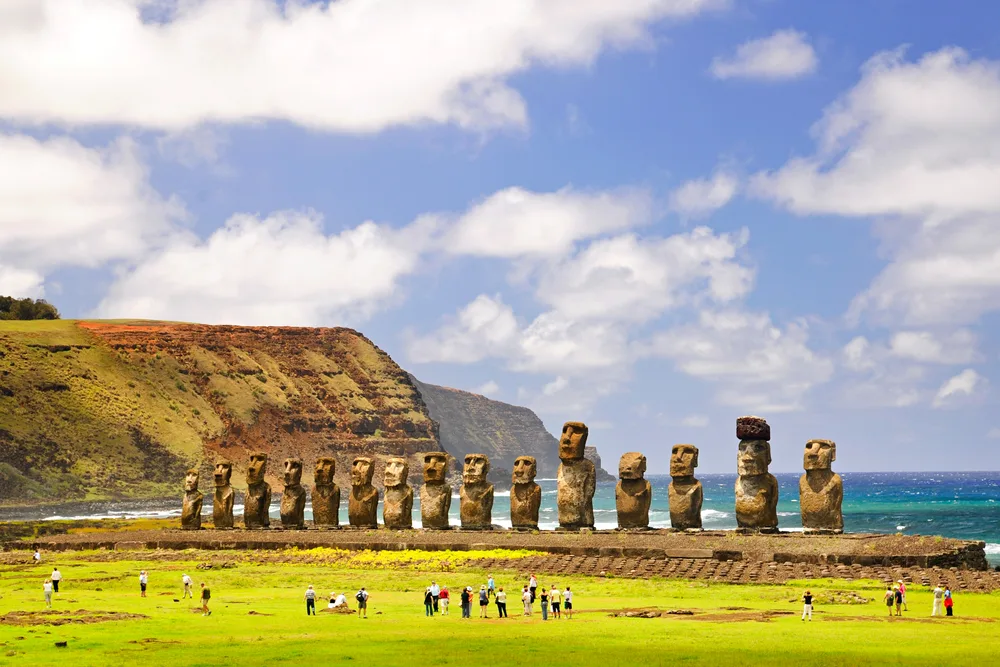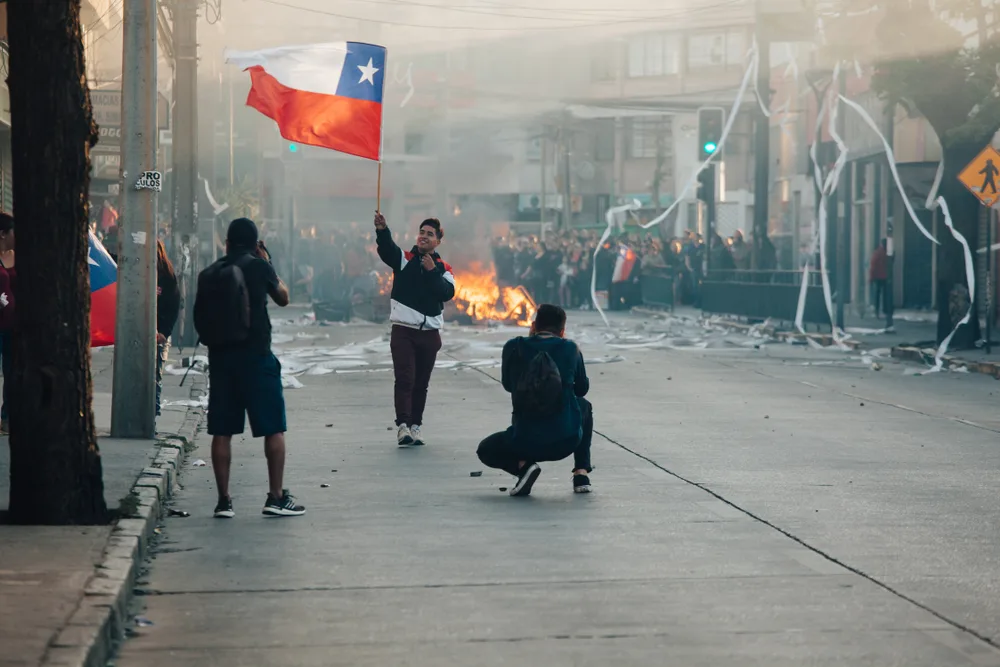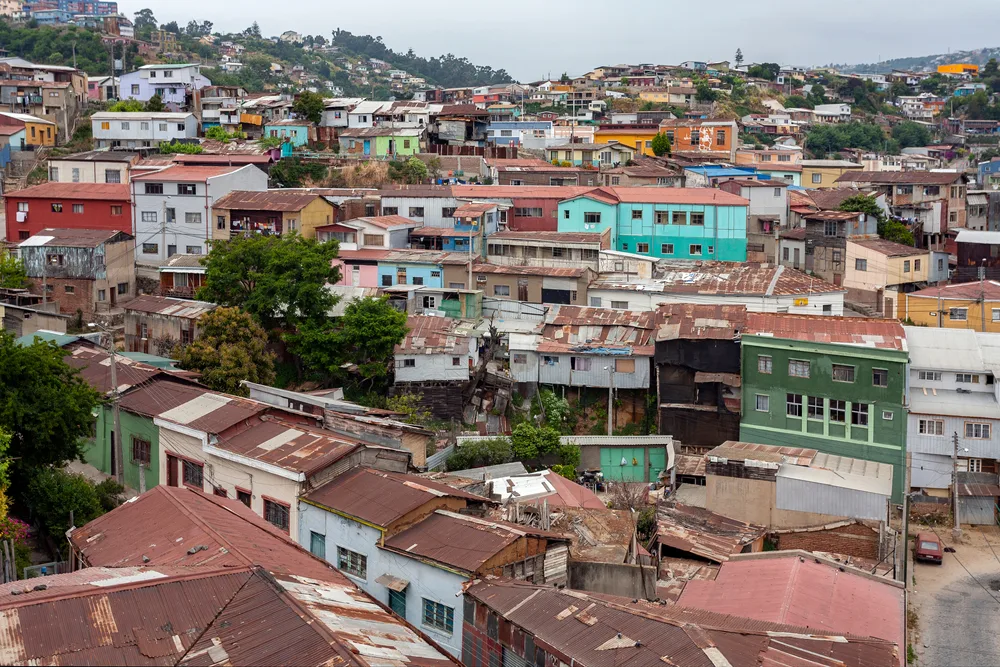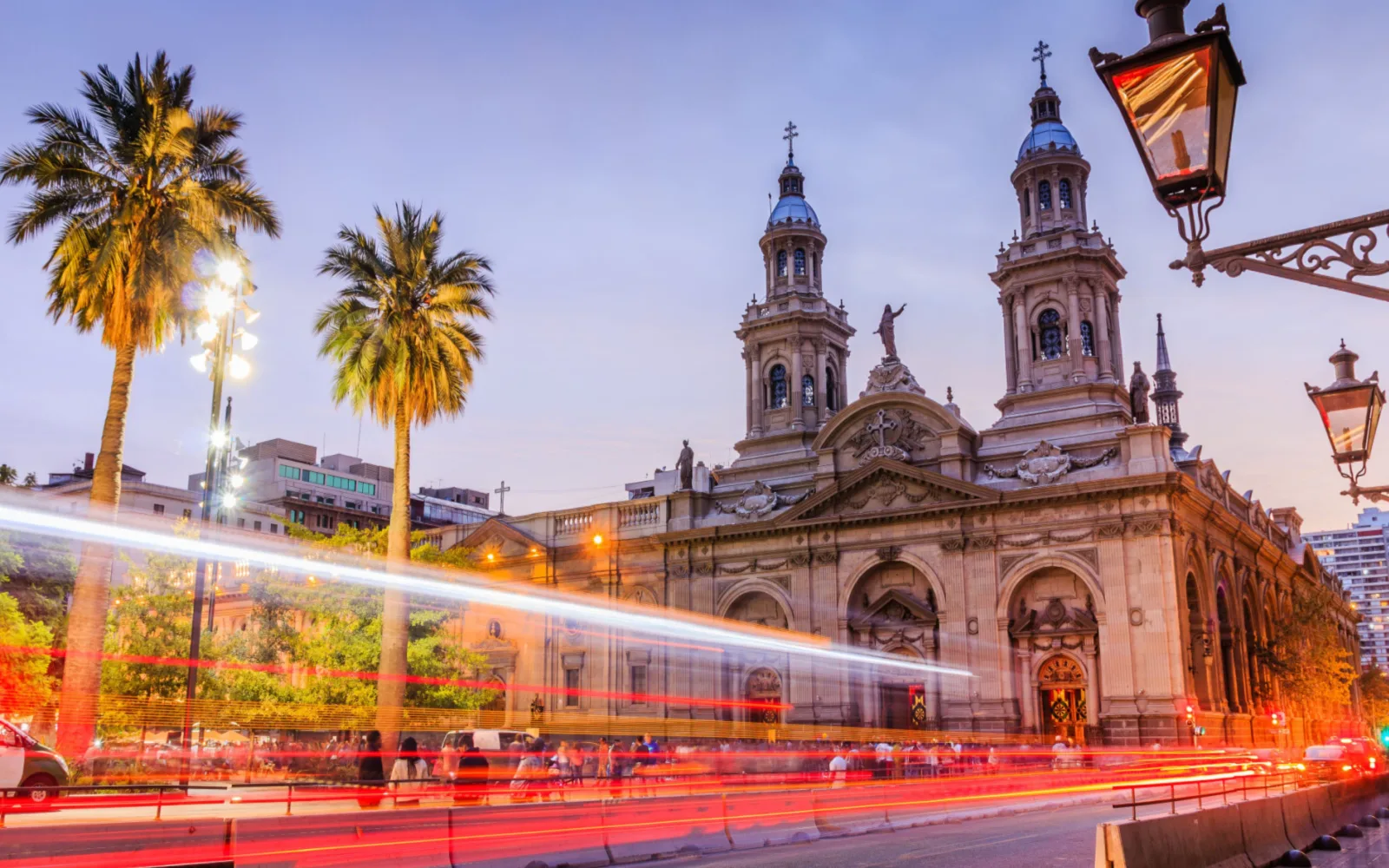Is Chile safe to visit in 2026?
Chile is a very safe country to visit and is probably one of the safest destinations in Latin America. Tourists sometimes experience petty crimes such as theft and bag snatching, but violent crime rates are low. However, keep an eye on the political situation, as there has been a lot of civil unrest over the past few years.
Chile is one of the most stunning countries in South America. Stretching along the Pacific Coast of the continent, containing thousands of miles of dramatic shore, mountains, and many other natural wonders, the country attracts about 5 million tourists a year.
Visitors certainly have much to see, from historic cities such as Valparaíso to natural beauty in the Torres del Paine. But while this storied country is rich in culture and history, is Chile safe to visit? Here’s our expert take.
Is Chile Safe to Visit in 2026?

Amy Nichole Harris/Shutterstock
Yes. Chile is a very safe country to visit and is probably one of the safest destinations in Latin America. Tourists sometimes experience petty crimes such as theft and bag snatching, but violent crime rates are low.
However, keep an eye on the political situation, as there has been a lot of civil unrest over the past few years. A good barometer of how safe travel to Chile can be is the Global Peace Index.
This global metric analyzes every country in the world according to a few indexes, including domestic conflict and safety for residents. Chile is one of the safer countries in the world, ranking at #55 in the world as of 2022.
A few factors have made Chile slightly less safe over the past few years (also knocking it down in the Global Peace Index rankings). The most important one is civil unrest.
Many foreign governments, including the United States, warn citizens to exercise increased caution when visiting Chile due to civil unrest and frequent protests. Chile has a tumultuous recent history and was even ruled by a military dictatorship for part of the 20th century.
The most recent period of unrest started in the fall of 2019 when students protested subway fare increases in Santiago, which then turned into country-wide unrest about widespread economic inequality and an unfair constitution.
Several people died, and hundreds more were injured in the crackdown. Protests have calmed down since 2021, but they still occur regularly, as Chileans are not satisfied with the (extremely slow) rate of progress on the issues that affect their lives.
You might encounter some demonstrations in bigger cities, especially in the capital Santiago. Read the local news when you visit and stay alert. Demonstrations can turn violent or be repressed by the police, so avoid getting caught up in one.
Demonstrations often affect regular life around the city, including public transportation, so adjust your plans accordingly. Besides civil unrest, people visiting Chile are often concerned about crime.
The most common crimes you might encounter while in the country include:
- Pickpocketing
- Bag snatching
- Scams
- Armed robbery
- Vehicular robbery
However, the crime rate is low enough that besides using some common sense, you don’t have to worry too much about being the victim of a serious crime while in Chile.
One last thing to keep in mind about safety in Chile is the prevalence of natural disasters. Chile is located on the fault line between the Nazca and South American plates, which gave the country its spectacular mountains but also makes it prone to earthquakes.
Read up on earthquake safety protocols before you travel there and be prepared for regular trembles — and for your new Chilean friends to not bat an eye at earthquakes below 6 on the Richter scale.
If you’re going out on a hike or trek, make sure that you aren’t choosing a trail that is too difficult for you. Be prepared for drastically changing temperatures and altitude sickness. In the summer, some areas are prone to wildfires.
Crime in Chile

QUILPUÉ, CHILE – OCTOBER 20, 2019 – Barricades during protests of the “Evade” movement against the government of Sebastian Piñera/erlucho/Shutterstock
The most common concern most people have when traveling abroad is crime. After all, nobody wants to lose their valuables or get hurt while on vacation. Luckily, the crime rate in Chile is very low.
The violent crime rate in Chile is low. The homicide rate in 2020 was just 4.84 incidents per 100,000 people — and that was considered a particularly turbulent year.
For comparison, the homicide rate in the United States in the same year was 6.52 incidents per 100,000 people. According to NationMaster, a site that compares different countries and their crime rates, Chile stacks up well.
It has a lower rape rate, burglary rate, and overall crime rate than the United States. The most common crime you have to worry about in Chile, and one that locals worry about as well, is robbery.
According to an informal survey conducted by Cost of Living, respondents rated their worries about being mugged or robbed at 63.69 out of 100, a high score. People also worry about other forms of theft, such as vehicle break-ins, carjacking, and petty theft.
The worry is backed up by statistics. According to Knoema, the robbery incidence rate in Chile is 639 cases per 100,000 people. Robberies affect locals and tourists alike.
It makes sense that robberies are so high in a country with such a high level of income inequality. The GINI coefficient, which measures inequality, is 44.9, worse than other countries with a reputation for inequality, such as Haiti.
When there is such a wide gap between the rich and the poor, the incentives for robbery are firmly fixed in place. Most cases of robberies are still nonviolent crimes of opportunity, at least.
Petty Theft
The most common crime tourists encounter in Chile is petty theft in all of its forms. Australia warns its citizens in its travel advisory that petty crime is prevalent throughout the country, especially in bigger cities that attract a lot of tourists, such as Santiago and Valparaíso.
Thieves usually use distraction to take advantage of their victims. Beware of anyone trying to get your attention, such as spilling something on you, striking up an intense conversation, or dropping something and asking for help.
Usually, an accomplice will rob you while you are distracted by the social butterfly. Other thieves don’t need to create a distraction but rely on tourists’ natural inattention.
When walking through crowded tourist areas, keep a firm grip on your bag to avoid being the victim of a pickpocket or motochorros, local motorcycle bag snatchers. Never let your bag hang off the back of a chair, even in a restaurant or hotel lobby that feels safe.
Those places are still public spaces where anyone can come in and get away with your valuables. Stay close to your bag at all times when traveling, especially at crowded bus stations.
Tourist scams are also common in Chile. Be careful with financial transactions. Credit card skimming is sadly common, so make sure that when you pay with a credit card at a restaurant or shop, it never leaves your sight.
Some ATMs also have skimmers, so only use those inside bank branches or other secure locations. Be careful when taking taxis, as some will overcharge tourists while others are unauthorized taxis posing as professionals to lure in unsuspecting tourists.
One form of petty theft widespread throughout Chile is vehicular theft targeting rental cars driven by foreigners. According to the Canadian government advisory, thieves puncture the tire of a rental car.
When the driver gets out to check the flat tire, thieves break into the car and steal valuables. If you get a suspicious flat tire, never let your wallet out of sight while you check it.
Some basic precautions can help you avoid theft. Never flash your valuables or carry too much money on your person.
Carry photocopies of your documents while out and about for the day instead of the real deal. Trust your instincts, and if a situation feels dangerous, get out of there.
Armed Robbery
Although violent crime, especially incidents directed at tourists, is rare in Chile, it does occur. The most common violent crime is armed robbery. The British Embassy in Chile reports an increase in armed robberies, including carjacking.
Thieves usually target wealthy areas of Santiago or Valparaíso or carjack expensive cars on intercity highways. Tourists are not usually at risk of carjacking, but if you are renting a car, it still pays to be cautious.
The UK government also warns citizens that there have been incidents of thieves following tourists from the airport to their accommodations for the purpose of robbing them.
Make sure that you only take reputable taxis, not unauthorized taxis that might be working with an accomplice. Before entering your hotel, make sure that you are not being followed. Choose accommodations with good security.
Violent crime is most common at night in major cities, so be careful as you’re moving around.
Don’t wander down isolated streets, and use a ride-hailing app instead of hailing a taxi on the street. There have been cases of robbers spiking victims’ drinks in clubs, so keep a close eye on your beverages.
Avoiding Bad Areas

Steve Allen/Shutterstock
Avoiding bad neighborhoods, especially in bigger cities such as Santiago or Valparaíso, can help you stay safe. In Santiago, be careful when walking around the parks Cerro San Cristóbal or Cerro Manquehue, as muggers target people walking alone, even during the day.
Stick to the well-trafficked main paths. Be careful around the nightlife districts, Bellavista and Barrio Brasil, as robbers take advantage of inebriated tourists.
Pickpocketing is common in the main tourist areas, such as Mercado Central. The neighborhoods of Vitacura and Las Condes have higher crime rates.
Valparaíso is beautiful but has an elevated crime rate by Chilean standards. Avoid neighborhoods high on the hills, as those tend to be more dangerous. Avoid walking alone through the area between Plaza Sotomayor and the harbor.
The Calama bus station is notorious for being the worst for luggage theft, so keep a close eye on your bags.
For now, avoid traveling to the southern Chilean region Araucanía as it is the site of serious civil unrest and clashes between indigenous Mapuche people and the government.
Things to Consider
Here are a few other things to keep in mind while traveling in Chile:
- Chile’s stray dogs are adorable, but some carry diseases such as rabies and scabies, so be careful when petting them.
- Pre-book your taxis or save the number of an authorized taxi company, as unlicensed taxis often rob or scam customers.
- Chile has some active volcanoes, so check seismic reports if you are traveling near them.
- Be careful when hiking near the borders with Peru, Bolivia, and Argentina, as there are many minefields.
Frequently Asked Questions

Ilkim Idil Bursa/Shutterstock
Here are some questions you might still have about traveling to Chile:
Is Chile safe to travel to right now?
As of 2023, Chile is safe to travel to! Protests and demonstrations are still common, but the political situation has calmed down a lot since the 2021 elections.
Is Chile expensive to visit?
Chile is not expensive by global standards but is probably the most expensive country in South America. Prices are moderate but definitely not as inexpensive as those on the South American backpacker circuit.
Is it safe to walk around Santiago, Chile?
During the day, it is safe to walk around Santiago, as long as you keep an eye on your surroundings and don’t make any big mistakes, such as walking down deserted alleyways. At night, the city is less safe, so stick to very busy streets and take a taxi back to your hotel.
What is the safest place in Chile?
According to many bloggers (and crime statistics), Punta Arenas is one of the safest destinations in Chile. This city in the southernmost Chilean region offers plenty to do and is a great base for exploring the south.
What should I avoid in Chile?
In Chile, avoid traveling to sketchy areas. Research the bad neighborhoods in the city you are staying in or ask your accommodations for tips. Avoid discussing politics as you never know what your new friends might think — the country is very politically polarized.
So Is It Safe to Visit Chile?
Chile is one of the safest countries in South America to visit. As long as you avoid political demonstrations and keep a close eye on your valuables, you should be safe. So what are you waiting for — book your trip to Chile today and experience its beauty for yourself!



